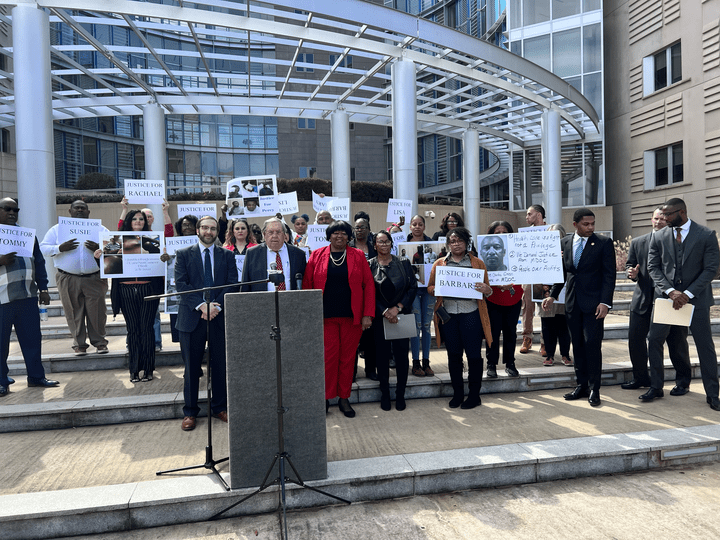Mississippi Today
As cancer spread in Susie Balfour’s body, she says prison medical providers failed to treat it. Now she’s fighting for life.

A formerly incarcerated woman facing terminal breast cancer is suing the prison system’s former and current health care providers for failing to diagnose and treat the disease until it spread in her body.
Susie Annie Balfour, 62, of Memphis, is the plaintiff in a federal lawsuit filed Wednesday in the U.S. District Court for the Southern District of Mississippi that alleges prison medical officials acted with deliberate indifference because they knew for years that she might have cancer, but they did not order a biopsy to confirm until November 2021.
Over the course of a decade, Balfour had at least eight mammograms at Merit Health Central in Jackson. That number is less than the annual mammograms and later twice a year mammograms outside doctors recommended after each of her visits, according to the lawsuit.
Stage 4 cancer has metastasized and spread to Balfour’s lymph nodes, bones and other parts of her body. She said she’s trying to stay encouraged and do what she can.
“I never know when my time will be up, but until then I’m not going to stop fighting,” said Balfour, who was incarcerated at the Central Mississippi Correctional Facility for over 30 years and released on parole in December 2021.
The complaint alleges the contract between the Mississippi Department of Corrections – which is not named as a defendant – and former medical contractors Wexford Health Sources and Centurion of Mississippi and current contractor VitalCore Health Strategies created financial incentive for the companies to withhold necessary and lifesaving care to incarcerated people.
How that manifested was reduced outpatient referrals and hospitalizations and encouragement of conservative care to cut costs, according to the complaint.
“This is just another avenue to draw attention to what’s happening in the prisons,” said Andrew Tominello, who is representing Balfour.
Balfour first asked prison medical staff for a mammogram in June 2011.
After that visit, doctors recommended she return for follow-up annual mammograms to monitor any changes in calcifications found in her right breast. By 2016, doctors recommended she have mammograms every six months.
Instead, Balfour went up to three years between follow-ups, according to the lawsuit.
It wasn’t until Nov. 3, 2021, that a biopsy revealed Balfour had an invasive, malignant cancer in her breast, court documents state.
The lawsuit alleges VitalCore was aware of the doctors’ findings from the November visit and did not inform Balfour about the cancer until days before her release on Dec. 27, 2021.
Less than a week after leaving prison, Balfour went to the University of Mississippi Medical Center where she had another mammogram and full testing, which the doctor used to diagnose her cancer as Stage 4.
Balfour wonders if actions had been taken sooner, maybe things would have turned out differently with her health.
On behalf of its provider VitalCore, MDOC declined to comment. Representatives from Centurion and Wexford did not respond to a request for comment.
Other defendants named in the lawsuit are Merit Health Central and multiple physicians and nurses employed by the hospital and prison health care providers. The lawsuit accuses them of malpractice for failing to properly diagnose and treat Balfour, causing her cancer to progress.
A spokesperson for Merit Health declined to comment. Defendants will have 21 days to respond to the lawsuit complaint.
The lawsuit also alleges Balfour and other incarcerated people were required to clean the prison with chemicals such as glyphosate that are known to cause cancer. They were not given protective equipment when mixing raw chemicals to avoid exposure, according to the complaint.
To date, at least 15 other people incarcerated at CMCF have cancer, and they are not receiving “necessary, life-saving treatment,” according to the lawsuit.
READ: SMCI inmate, fearing he has cancer, still awaiting needed medical procedure, he says
“These are human beings that deserve a second chance in life. Instead they’re being allowed to get sick and left to die,” Pauline Rogers, co-founder of the RECH Foundation that helps women returning from prison, said in a statement.
Balfour is seeking compensatory and punitive damages to be determined at trial.
Centurion became MDOC’s inmate health care provider in 2016 after a multi-year bribery scandal that led to the 2014 indictment of then-MDOC commissioner Christopher Epps and prison contractors including Wexford. VitalCore Health Strategies became the provider in 2020.
In a separate lawsuit, VitalCore is being sued for failing to provide adequate medical and mental health care to incarcerated people and proper accommodations and services to those with disabilities.
Balfour was incarcerated for a capital murder conviction in the shooting death of a Southaven police officer that carried a death sentence that was overturned in 1991. She was resentenced to serve 30 years, according to court records.
“I just want everybody to be held accountable,” she said. “ … and I just want justice for myself and other ladies and men in there who are dealing with the same situation I am dealing with.”
This article first appeared on Mississippi Today and is republished here under a Creative Commons license.![]()
Mississippi Today
On this day in 1951, Ruby Hurley opened NAACP office in South
April 28, 1951

Ruby Hurley opened the first permanent office of the NAACP in the South.
Her introduction to civil rights activism began when she helped organize Marian Anderson’s 1939 concert at the Lincoln Memorial. Four years later, she became national youth secretary for the NAACP. In 1951, she opened the organization’s office in Birmingham to grow memberships in Alabama, Florida, Georgia, Mississippi and Tennessee.
When she arrived in Mississippi, there were only 800 NAACP members. After the governor made remarks she disagreed with, she wrote a letter to the editor that was published in a Mississippi newspaper. After that step in courage, membership grew to 4,000.
“They were surprised and glad to find someone to challenge the governor,” she told the Chicago Defender. “No Negro had ever challenged the governor before.”
She helped Medgar Evers investigate the 1955 murder of Emmett Till and other violence against Black Americans. Despite threats, she pushed on.
“When you’re in the middle of these situations, there’s no room for fear,” she said. “If you have fear in your heart or mind, you can’t do a good job.”
After an all-white jury acquitted Till’s killers, she appeared on the front cover of Jet magazine with the headline, “Most Militant Negro Woman in the South.”
Months later, she helped Autherine Lucy become the first Black student at the University of Alabama.
For her work, she received many threats, including a bombing attempt on her home. She opened an NAACP office in Atlanta, where she served as a mentor for civil rights leader Vernon Jordan, with whom she worked extensively and who went on to serve as an adviser to President Bill Clinton.
After learning of Evers’ assassination in 1963, she became overwhelmed with sorrow. “I cried for three hours,” she said. “I shall always remember that pool of blood in which he lay and that spattered blood over the car where he tried to drag himself into the house.”
She died two years after retiring from the NAACP in 1978, and the U.S. Post Office recognized her work in the Civil Rights Pioneers stamp series. In 2022, she was portrayed in the ABC miniseries, “Women of the Movement.”
This article first appeared on Mississippi Today and is republished here under a Creative Commons Attribution-NoDerivatives 4.0 International License.![]()
Note: The following A.I. based commentary is not part of the original article, reproduced above, but is offered in the hopes that it will promote greater media literacy and critical thinking, by making any potential bias more visible to the reader –Staff Editor.
Political Bias Rating: Centrist
This content is primarily focused on the historical and personal achievements of Ruby Hurley, a civil rights activist. It emphasizes her dedication and bravery in challenging oppressive systems and advocating for racial justice. The narrative does not appear to endorse or criticize any contemporary political positions but highlights Hurley’s work with the NAACP and her role in significant civil rights events. While it mentions her opposition to certain government figures and the threat she faced, the tone is largely factual and centered on her contributions to history, which supports a centrist position without leaning toward a particular ideological side.
Mississippi Today
Podcast: Mississippi citizens often left in the dark on special-interest lobbying of politicians
The post Podcast: Mississippi citizens often left in the dark on special-interest lobbying of politicians appeared first on mississippitoday.org
Note: The following A.I. based commentary is not part of the original article, reproduced above, but is offered in the hopes that it will promote greater media literacy and critical thinking, by making any potential bias more visible to the reader –Staff Editor.
Political Bias Rating: Center-Left
This content reflects a Center-Left bias primarily due to its focus on transparency issues regarding special-interest spending and lobbying in Mississippi. The mention of negative implications associated with lobbying efforts suggests an advocacy for accountability and reform, which aligns with a progressive stance often seen in Center-Left discourse. Additionally, the subject matter, involving regulation of online sports betting, typically garners support from more liberal perspectives concerned about consumer protection and ethical governance.
Mississippi Today
Derrick Simmons: Monday’s Confederate Memorial Day recognition is awful for Mississippians
Editor’s note: This essay is part of Mississippi Today Ideas, a platform for thoughtful Mississippians to share fact-based ideas about our state’s past, present and future. You can read more about the section here.
Each year, in a handful of states, public offices close, flags are lowered and official ceremonies commemorate “Confederate Memorial Day.”
Mississippi is among those handful of states that on Monday will celebrate the holiday intended to honor the soldiers who fought for the Confederacy during the Civil War.
But let me be clear: celebrating Confederate Memorial Day is not only racist but is bad policy, bad governance and a deep stain on the values we claim to uphold today.
First, there is no separating the Confederacy from the defense of slavery and white supremacy. The Confederacy was not about “states’ rights” in the abstract; it was about the right to own human beings. Confederate leaders themselves made that clear.
Confederate Vice President Alexander Stephens declared in his infamous “Cornerstone Speech” that the Confederacy was founded upon “the great truth that the negro is not equal to the white man.” No amount of revisionist history can erase the fact that the Confederacy’s cause was fundamentally rooted in preserving racial subjugation.
To honor that cause with a state holiday is to glorify a rebellion against the United States fought to defend the indefensible. It is an insult to every citizen who believes in equality and freedom, and it is a cruel slap in the face to Black Americans, whose ancestors endured the horrors of slavery and generations of systemic discrimination that followed.
Beyond its moral bankruptcy, Confederate Memorial Day is simply bad public policy. Holidays are public statements of our values. They are moments when a state, through official sanction, tells its citizens: “This is what we believe is worthy of honor.” Keeping Confederate Memorial Day on the calendar sends a message that a government once committed to denying basic human rights should be celebrated.
That message is not just outdated — it is dangerous. It nurtures the roots of racism, fuels division and legitimizes extremist ideologies that threaten our democracy today.
Moreover, there are real economic and administrative costs to shutting down government offices for this purpose. In a time when states face budget constraints, workforce shortages and urgent civic challenges, it is absurd to prioritize paid time off to commemorate a failed and racist insurrection. Our taxpayer dollars should be used to advance justice, education, infrastructure and economic development — not to prop up a lost cause of hate.
If we truly believe in moving forward together as one people, we must stop clinging to symbols that represent treason, brutality and white supremacy. There is a legislative record that supports this move in a veto-proof majority changing the state Confederate flag in 2020. Taking Confederate Memorial Day off our official state holiday calendar is another necessary step toward a more inclusive and just society.
Mississippi had the largest population of enslaved individuals in 1865 and today has the highest percentage of Black residents in the United States. We should not honor the Confederacy or Confederate Memorial Day. We should replace it.
Replacing a racist holiday with one that celebrates emancipation underscores the state’s rich African American history and promotes a more inclusive understanding of its past. It would also align the state’s observances with national efforts to commemorate the end of slavery and the ongoing pursuit of equality.
I will continue my legislative efforts to replace Confederate Memorial Day as a state holiday with Juneteenth, which commemorates the freedom for America’s enslaved people.
It’s time to end Confederate Memorial Day once and for all.
Derrick T. Simmons, D-Greensville, serves as the minority leader in the state Senate. He represents Bolivar, Coahoma and Washington counties in the Mississippi Senate.
This article first appeared on Mississippi Today and is republished here under a Creative Commons Attribution-NoDerivatives 4.0 International License.
The post Derrick Simmons: Monday's Confederate Memorial Day recognition is awful for Mississippians appeared first on mississippitoday.org
Note: The following A.I. based commentary is not part of the original article, reproduced above, but is offered in the hopes that it will promote greater media literacy and critical thinking, by making any potential bias more visible to the reader –Staff Editor.
Political Bias Rating: Left-Leaning
This article argues against the celebration of Confederate Memorial Day, stating it glorifies a racist and failed rebellion that is harmful to societal values. It critiques the holiday as a symbol of white supremacy and advocates for replacing it with Juneteenth to honor emancipation. The language used, such as referring to the Confederate cause as “moral bankruptcy,” and the call to replace the holiday reflects a progressive stance on social justice and racial equality, common in left-leaning perspectives. Additionally, the writer urges action for inclusivity and justice, positioning the argument within modern liberal values.
-

 SuperTalk FM6 days ago
SuperTalk FM6 days agoNew Amazon dock operations facility to bring 1,000 jobs to Marshall County
-

 News from the South - Missouri News Feed2 days ago
News from the South - Missouri News Feed2 days agoMissouri lawmakers on the cusp of legalizing housing discrimination
-

 News from the South - Alabama News Feed7 days ago
News from the South - Alabama News Feed7 days agoPrayer Vigil Held for Ronald Dumas Jr., Family Continues to Pray for His Return | April 21, 2025 | N
-

 News from the South - Florida News Feed6 days ago
News from the South - Florida News Feed6 days agoTrump touts manufacturing while undercutting state efforts to help factories
-

 Mississippi Today4 days ago
Mississippi Today4 days agoStruggling water, sewer systems impose ‘astronomic’ rate hikes
-

 News from the South - Florida News Feed6 days ago
News from the South - Florida News Feed6 days agoFederal report due on Lumbee Tribe of North Carolina’s path to recognition as a tribal nation
-

 News from the South - Oklahoma News Feed6 days ago
News from the South - Oklahoma News Feed6 days agoOklahoma Treasurer’s Office Faces Scrutiny Over Use of Signal in Anti-ESG Coordination
-

 News from the South - Georgia News Feed6 days ago
News from the South - Georgia News Feed6 days agoOrganization files ethics complaint against Warnock | Georgia














































